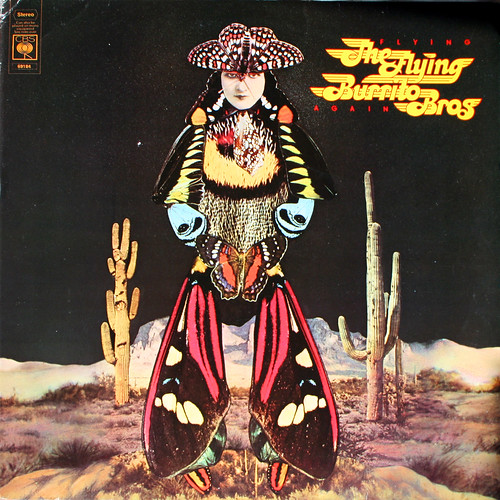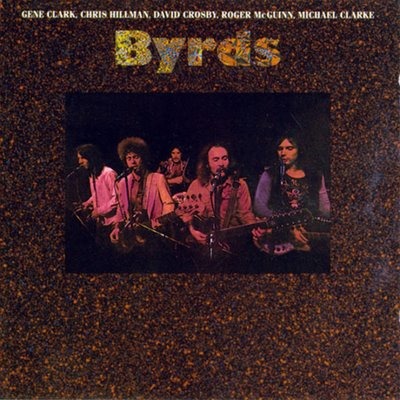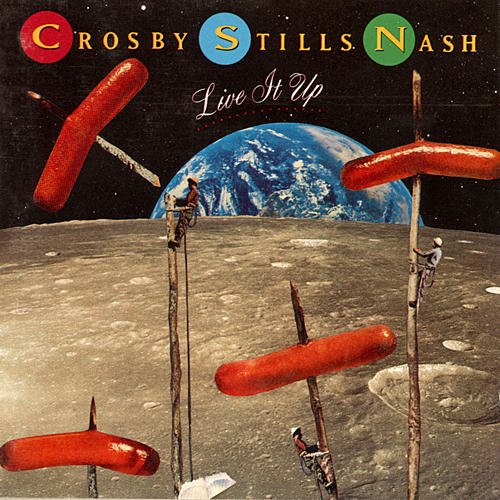In their second or third (depending on how one defines it)
configuration, stripped of the most crucial initial members, the FBB are basically a bunch of journeyman session dudes with
no particular propensity for songwriting or distinct musical identity. The
attenuated Byrds connection is down to Gene Parsons, probably the most credible
writer of the bunch (his “Desert Childhood” comes closer to memorable than the rest of the album), even if, as Country Rock Blog notes, his status as one “G.
Parsons” might have been his real ticket into the band. Nothing sticks out but
nothing grates, right up until the terribly misguided decision to end things
with a “Hot Burrito #3,” which reeks of such pathetic desperation, bottom
feeding, and outright gravedigging that it can’t help but leave a sour taste as
the final impression.
Tuesday, May 28, 2013
Monday, May 20, 2013
Desert Rose Band, s/t (1987)
Anyone who hadn’t
written Chris Hillman off by 1987 was delusional; the guy had by that point largely
phoned in the last 15 somnolent years. So it’s startling to hear him spring
back to life on this. The basic idea of the Desert Rose Band is Bakersfield
classicism run though the glossy lens of 80s pop-country, and dubiousness of
that formula notwithstanding, they nail it. Hillman writes vibrant originals
for the first time in ages, and classic chestnuts like “Ashes of Love” are
polished until they fit seamlessly alongside whatever Randy Travis singles were
hot that year (recovering and overhauling Hillman’s Byrds gem “Time Between” is
a particularly nifty trick). The reverence of the early Burrito Bros. is
nowhere to be found—this group is out for hits, not some fetishized notion of authenticity—but that smiling shamelessness is exactly why it works.
Sunday, May 19, 2013
Byrds, s/t (1973)
The main thing a 1973 album featuring all five original
Byrds (no "the" anymore, it seems) has going for it is low expectations; none of these dudes was near his prime by this point except for Gene Clark (and nobody seemed to care about him, inexplicably), so to hear this album rise to comfortable mediocrity is a
pleasant surprise. That said, apparently nobody had lower expectations than the
Byrds themselves, since most of them bring their scattered leftover songs
rather than prime material, which they hoarded for their
various solo pursuits. It’s like some unfortunate hybrid of the prisoner’s
dilemma and the free rider problem.
It starts off strong, with Clark’s “Full Circle”
(admittedly, recycled from his solo album Roadmaster, but given that that album
only came out in, what, the Netherlands, I’ll call this fair) and another Clark
tune on the first side; it’s smart enough to bury its two tuneless David Crosy
atrocities on side two (one of which is also repeated, less excusably, from his
own solo album of two years earlier). Chris Hillman gets two breezy little
ditties that anticipate the effortlessly-forgettable Doobie Bros, and McGuinn
even offers a decent folksy tune of his own (in addition to the bottom-feeding
“Born to Rock’n Roll,” the sort of thing T-Rex did better but which should really not
be done at all).
It’s rounded out by two Neil Young covers, bad ideas both.
“Cowgirl in the Sand” comes at its most un-rocking, McGuinn’s claims
notwithstanding, and while I understand the impulse to cover “(See the Sky)
About to Rain,” truly one of the most beautiful songs in the Young songbook, not even Clark's vocals can top Young's own, and the band plays watered-down soft rock.
Why the back cover so emphasizes Hillman's splayed crotch, that I cannot say.
Thursday, May 16, 2013
Crosby, Stills, Nash, and Young, So Far (1974)
Has a cash-in ever been as cynical as this greatest hits that consolidates all two studio albums and two non-LP tracks, one of them a piddling Stills effort? I blame David Crosby. Shameful.
Saturday, May 11, 2013
New Riders of the Purple Sage, Brujo (1974)
When I was a teenager, punk songs about how the only good
Deadhead is one that is dead were my idea of clever songwriting. Then I grew
up, got more boring and/or less dogmatic, and reluctantly conceded that at
least American Beauty and Workingman’s Dead are better than 85% of all punk albums.
Even still, the idea of volitionally listening to a Dead spinoff
seemed beyond the pale, but here I am, rocking some New Riders solely on
account of Skip Battin’s presence in the band (begun with this album, their
sixth). Battin was arguably the third least essential Byrd, after passing
bassist John York and mediocre drummer Michael Clarke, but completist tendencies are ugly
things.
It’s not bad, the album. The first side, in particular, rides a mellow
stoned country groove through a spirited rendition of Bob Dylan’s “You Angel You” (from which Roger McGuinn in 1974 could have taken a cue or two, given his lifeless covers of the era) and the great standard “Ashes of Love,” along with singer John Dawson’s “Instant
Armadillo Blues,” whose tale of “going down to Austin” to watch the armadillos could have come straight off the pages of a Tom Robbins novel. Then Battin and songwriting
partner Kim Fowley take over side 2 and grind things to a halt with more of the
simplistic novelty songs that they had already dumped on several late-period
Byrds albums. Considering that the New Riders were cranking out multiple albums
per year at this point, I suppose the stakes were low and consequences small.
But still, Battin doesn't add much to the group except song-quantity--which probably counted for something given their prolific output.
Friday, May 10, 2013
Roger McGuinn and Band (1975)
Rock democracy has a pretty checkered history, unless you
consider Stu Cook a songwriter on par with John Fogerty or want to hear some
random guy sing about his air mattress on a Conor Oberst album. When Roger
McGuinn undertook a songwriting democratization on his third solo album,
however, rather little was at stake; his first two albums were already awash in
hired-hack-written tunes. Plus, they were both mediocre at best, so what was
bringing the boys from the band in gonna do, wreck a winning streak?
Hardly. The backup dudes hold their own against McGuinn,
though it’s a lightly stacked balance beam on both ends (still better than the
first two solo albums, admittedly). Bassist Stephen Love opens with the slick,
radio-ready “Somebody Loves You,” and while the other guys bog down side 1 with
songs about a dog and painted ladies (they represent better on side 2), they’re still closer to quality than
McGuinn’s soggy run through “Knockin’ on Heaven’s Door.” Plus, the fearless leader is reduced to
retrieving his own “Lover of the Bayou” from the opening-track slot on a
5-year-old Byrds album, hardly plucked from obscurity but rather reeking of
desperation. At least it has a fiery guitar solo, rare proof that McGuinn was
awake for at least one moment in the 1970s.
Saturday, May 4, 2013
Crosby Stills Nash, Live It Up (1990)
From the very first sounds, several thwacks of a
reverb-drenched drum leading into some limp synth vamping, Live It Up is such a sad embarrassment that you almost, almost feel sorry for these poor
desperate fools. They’re so washed up that they farmed out much of the
songwriting to a bunch of anonymous hacks and hangers-on, and when Stills
does deliver a composition at track three, you immediately wish they’d just
admitted defeat and brought Desmond Child onboard. A quarter-century of wealth
and fame, and here’s what Stills has to say: “Tomboy, always with the wrong
boy/You need a strong boy, Tomboy, Tomboy.” She also shoots pool, and –wait for
it, I quote verbatim—“got a heart of gold.” For shame, man.
Crosby’s accumulated wisdom isn’t much better—let’s see, it’s bad when teenagers in Ireland suffer,
and he “don’t care what has got you down/You can turn it around.” Graham Nash
just fades into the backdrop, an anonymous voice singing anonymous songs, and
there’s nothing to say about the sound of the album beyond the fact that it
consists of stale aping of already-retrograde sonic trends (for comparison: the
Damn Yankees’s debut came out this same year, and sounded vastly more relevant).
Every one of the ten tracks is a dull, plodding, soulless fiasco; offhand I
cannot think of a worse record by a washed-up 60s group striving for relevance.
The single meager positive thing to be said of this is that its goofy
hot-dogs-on-the-moon cover is better than some of the poor visual choices Joni
Mitchell was making around this time. Otherwise, an absolute zero all around.
Thursday, May 2, 2013
Gram Parsons/The Flying Burrito Bros., Sleepless Nights (1976)
For twelve songs squeezed out of a corpse, this isn’t half
bad. Nine outtakes from the original Burrito Bros lineup in 1970 with Chris
Hillman and the reliably dull Michael Clarke, and three Grievous Angels leftovers done with Emmylou Harris. It’s hard to
ever dislike the Gram-and-Emmy Show—songs come and songs go, some better than
others, but the two of them singing together sounds great regardless. There’s
not an original composition in the bunch, but it’s freeing to hear GP stop
striving for iconic status—always my least favorite aspect of his work—and just
honky-tonk unto oblivion. Plus, the songs are well-chosen; why stop with one
Merle Haggard tune when we can have two, the second of which is the perfectly
plaintive death-row lament “Sing Me Back Home,” the album’s highlight?
Otherwise, nothing here achieves classic status, but most of it falls just
short. In a pinch, I’d probably take it over Grievous Angel.
Subscribe to:
Comments (Atom)








